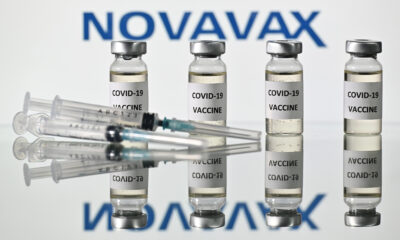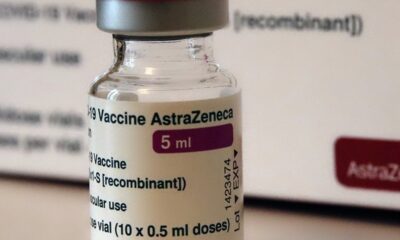The news of the death of 44-year-old BBC radio host; Lisa Shaw, who died few weeks ago has been a cause for debate. New findings finally reveal that the BBC presenter died due to complications from the AstraZeneca COVID-19 vaccine.
Lisa Shaw died at the Royal Victoria Infirmary in the city just over three weeks after her first dose of the vaccine, heard coroner Karen Dilks.
An inquest, which lasted less than an hour, was told she was admitted to hospital after she complained of headaches and doctors found a haemorrhage on her brain. Blood clots from AstraZeneca’s Covid vaccine are extremely rare but can kill up to a quarter of the few affected patients, according to a recent study.
The complication prompted UK health chiefs to recommend all under-40s get Pfizer or Moderna instead.
In a statement issued after the hearing, Shaw’s family said: ‘This is another difficult day in what has been a devastating time for us.
‘The death of our beloved Lisa has left a terrible void in our family and in our lives.
‘She truly was the most wonderful wife, mum, daughter, sister and friend.
‘We have said all we want to say in public at this time and ask to be left alone to grieve and rebuild our lives in private. Thank you.’
Shaw, who was not known to have any underlying health problems, developed ‘severe’ headaches a week after having the jab and fell seriously ill a few days later, her relatives previously said.
Her relatives previously said: ‘She was treated by the RVI’s [Royal Victoria Infirmary] intensive care team for blood clots and bleeding in her head.
‘Tragically she passed away, surrounded by her family, on Friday afternoon. We are devastated and there is a Lisa-shaped hole in our lives that can never be filled. We will love and miss her always.
‘It’s been a huge comfort to see how loved she was by everyone whose lives she touched, and we ask for privacy at this time to allow us to grieve as a family.’
UK regulators saw 411 instances of vaccine-induced immune thrombocytopenia and thrombosis after AstraZeneca’s jab up to July 28. Forty-three cases occurred after a second dose.
At that time, 24.8million Britons had received their first AstraZeneca jab and 23.6m had already been fully-vaccinated.
Dr Pavord told a press briefing for health journalists: ‘It’s important to stress that this kind of reaction to the Oxford-AstraZeneca vaccine is very rare.
‘In those aged under 50, incidence is around one in 50,000 among people who have received the vaccine.’
She also medics had not seen any cases of VITT in the last four weeks, which she said was ‘a tremendous relief’.
Their findings, published in the New England Journal of Medicine, showed the overall mortality rate was around 23 per cent.
The researchers evaluated 294 patients aged between 18 and 79. All the patients had received the first dose of AstraZeneca’s vaccine.
They said treating VITT may involve administering immunoglobulins intravenously to increase platelet count, steroids to dampen the immune system and blood thinners to prevent further blood clots.
And treatments such as plasma exchange, which involves removing straw-coloured liquid known as plasma from the blood and replacing it with new plasma fluid, can dramatically increase survival chances for those with severe disease.
Of those, 23 per cent died because of vaccine-induced immune thrombocytopenia and thrombosis (VITT) — the name of the side effect.
Experts claimed it was deadlier than other similar clotting disorders.
Thrombocytopenia is a condition where the patient has a low count of cells that help the blood clot, known as platelets. Thrombosis occurs when blood clots block veins or arteries, and is a major cause of strokes and heart attacks.
No clots have been seen for over a month, academics at Oxford University Hospitals NHS Foundation Trust also revealed. But this is mainly because no-one is getting the first dose of the vaccine anymore.
The risk of developing VITT from the second jab — given eight to 12 weeks after the first — is significantly lower.
For this reason, the researchers who investigated the link argued a third dose would probably carry an even smaller risk of blood clots.
In an earlier statement, an MHRA spokesperson said: ‘We are saddened to hear about the death of Lisa Shaw and our thoughts are with her family.
‘As with any serious suspected adverse reaction, reports with a fatal outcome are fully evaluated by the MHRA, including an assessment of post-mortem details if available.
‘Our detailed and rigorous review into reports of blood clots occurring together with thrombocytopenia is ongoing.’
Shaw previously worked in commercial radio and won a Sony Gold Award in 2012 for the breakfast show she hosted on Real Radio with co-host Gary Philipson.
Rik Martin, acting executive editor at BBC Radio Newcastle, said at the time of her death: ‘Everyone at the station is devastated and thinking about Lisa’s lovely family.
She was a trusted colleague, a brilliant presenter, a wonderful friend, and a loving wife and mum.
‘She loved being on the radio and was loved by our audiences.
‘We’ve lost someone special who meant a great deal to a great many people.’
Chris Burns, head of BBC Local Radio, added: ‘Lisa was a talented presenter who had already achieved a lot and would have achieved much more.’































